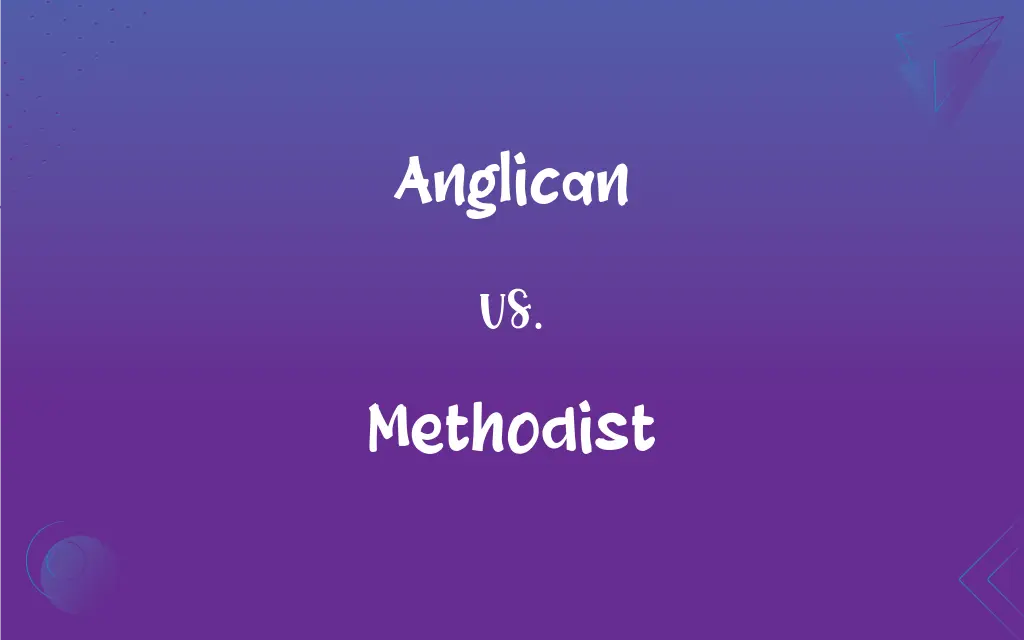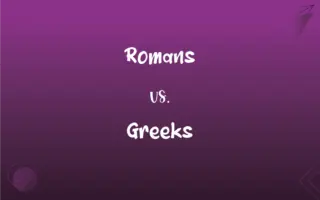Anglican vs. Methodist: What's the Difference?
Edited by Aimie Carlson || By Janet White || Published on December 25, 2023
Anglicanism is a tradition within Christianity encompassing the Church of England and its branches, while Methodism is a Protestant movement emphasizing personal faith and social justice.

Key Differences
Anglicanism originated in the 16th century with the Church of England's separation from the Roman Catholic Church, emphasizing a middle path between Protestantism and Catholicism. Methodism, founded by John Wesley in the 18th century, emerged from Anglicanism, focusing on personal faith, holiness, and social activism. Both share Protestant roots but differ in their approach to theology, worship, and church governance.
Anglican worship is characterized by its liturgical tradition, maintaining elements of Catholic rituals and sacraments, while also embracing Protestant principles. Methodist worship, while also liturgical, places greater emphasis on personal conversion experiences and active participation in social causes. Anglicans and Methodists both value scripture, tradition, and reason, but interpret and prioritize them differently.
In terms of governance, the Anglican Church retains a hierarchical structure with bishops, including the Archbishop of Canterbury as a spiritual leader. Methodism typically has a more democratic structure, with conferences and local church autonomy playing a significant role. Both Anglicanism and Methodism have a global presence, but Anglicanism is more closely associated with state institutions in some countries.
Theology in Anglicanism allows for a broad spectrum of beliefs, from conservative to liberal, maintaining unity in diversity. Methodist theology, while also diverse, is more uniformly evangelical, emphasizing personal salvation and a strong commitment to social justice. Both Anglican and Methodist traditions contribute significantly to Christian thought and social outreach.
Regarding social issues, the Anglican communion often shows a range of views, reflecting its diverse global membership. Methodism, historically and in the present, tends to be more uniformly progressive, especially in advocating for social reform and justice. Both Anglican and Methodist churches actively engage in charitable work, education, and advocating for societal change.
ADVERTISEMENT
Comparison Chart
Origins
Emerged in 16th century England
Originated in 18th century England
Worship Style
Liturgical with Catholic and Protestant elements
Emphasizes personal faith and social justice
Church Governance
Hierarchical with bishops and archbishops
Democratic, with conferences and local church autonomy
Theological Spectrum
Broad, from conservative to liberal
Generally evangelical with a focus on social justice
Approach to Social Issues
Diverse, reflecting global membership
Uniformly progressive, advocating social reform
ADVERTISEMENT
Anglican and Methodist Definitions
Anglican
Anglican refers to the faith, practices, and traditions of the Church of England and its branches.
The Anglican bishop led the service according to the Book of Common Prayer.
Methodist
Methodist describes a branch of Christianity that advocates for social justice and community service.
Methodist congregations are often involved in local community service projects and outreach programs.
Anglican
Anglican refers to a form of Christianity emphasizing both tradition and individual reasoning in spiritual matters.
The Anglican service combined traditional hymns with contemporary readings.
Methodist
Methodist refers to a Christian tradition prioritizing personal holiness and active faith expression.
Methodist worship services often include testimonies of personal faith experiences.
Anglican
Anglican denotes a Christian tradition that combines Catholic and Protestant elements.
Anglican churches often feature stained glass windows and choirs, reflecting their rich liturgical heritage.
Methodist
Methodist denotes a denomination known for its structured approach to worship and governance, yet flexible in doctrinal interpretation.
The Methodist church held a conference to discuss contemporary issues facing the congregation.
Anglican
Anglican pertains to the worldwide Anglican Communion, a family of churches in communion with the Archbishop of Canterbury.
Anglican missionaries have played a significant role in spreading Christianity globally.
Methodist
Methodist describes a Christian group that values both evangelical outreach and progressive social principles.
The Methodist youth group organized a fundraiser to support a local homeless shelter.
Anglican
Anglican describes a Christian denomination known for its middle way between Catholicism and Protestantism.
The Anglican Church's theology allows for a wide range of interpretations and beliefs.
Methodist
Methodist pertains to the Protestant Christian denomination founded by John Wesley, emphasizing personal faith and social activism.
The Methodist pastor's sermon focused on the importance of personal salvation and helping the needy.
Anglican
Of or characteristic of the Church of England or any of the churches related to it in origin and communion, such as the Episcopal Church.
Methodist
A member of an evangelical Protestant church founded on the principles of John and Charles Wesley in England in the early 1700s and characterized by active concern with social welfare and public morals.
Anglican
(Archaic) Of or relating to England or the English.
Methodist
Methodist One who emphasizes or insists on systematic procedure.
Anglican
A member of the Church of England or of any of the churches related to it.
Methodist
One who follows a method.
Anglican
English; of or pertaining to England or the English nation; especially, pertaining to, or connected with, the established church of England; as, the Anglican church, doctrine, orders, ritual, etc.
Methodist
(history of science) One who limits the domain of science to that which can be investigated using the scientific method.
Anglican
Pertaining to, characteristic of, or held by, the high church party of the Church of England.
Methodist
Alternative form of Methodist.
Anglican
A member of the Church of England.
Whether Catholics, Anglicans, or Calvinists.
Methodist
One who observes method.
Anglican
In a restricted sense, a member of the High Church party, or of the more advanced ritualistic section, in the Church of England.
Methodist
One of an ancient school of physicians who rejected observation and founded their practice on reasoning and theory.
Anglican
A Protestant who is a follower of Anglicanism
Methodist
One of a sect of Christians, the outgrowth of a small association called the "Holy Club," formed at Oxford University, a. d. 1729, of which the most conspicuous members were John Wesley and his brother Charles Wesley; - originally so called from the methodical strictness of members of the club in all religious duties.
Anglican
Of or pertaining to or characteristic of the Anglican church;
An Anglican Bishop
Methodist
A person of strict piety; one who lives in the exact observance of religious duties; - sometimes so called in contempt or ridicule.
Methodist
Of or pertaining to the sect of Methodists; as, Methodist hymns; a Methodist elder.
Methodist
A follower of Wesleyanism as practiced by the Methodist Church
Methodist
Of or pertaining to or characteristic of the branch of Protestantism adhering to the views of Wesley;
Methodist theology
FAQs
What is the role of bishops in Anglicanism and Methodism?
In Anglicanism, bishops play a central hierarchical role, while in Methodism, bishops are part of a more democratic governance structure.
What distinguishes Anglican from Methodist beliefs?
Anglicans blend Catholic and Protestant traditions, while Methodists focus on personal faith and social justice.
How do Anglican and Methodist worship services differ?
Anglican services are traditionally liturgical with Catholic and Protestant elements, while Methodist services emphasize personal faith experiences and may be more varied in style.
How do Anglican and Methodist views on social issues compare?
Anglicans often have diverse views reflecting their global membership, while Methodists are generally more uniformly progressive.
Can Anglicans and Methodists participate in each other's sacraments?
This varies by region and denomination, but there is often a degree of mutual recognition and participation.
Can Anglicans and Methodists intermarry?
Yes, intermarriage between Anglicans and Methodists is common and acceptable.
Is there a difference in the approach to baptism between Anglicans and Methodists?
Both practice infant baptism, but the theological emphasis and liturgical practices may vary.
Who founded Methodism?
Methodism was founded by John Wesley in the 18th century.
Are Anglicans and Methodists both Protestants?
Yes, both are branches of Protestant Christianity, with Anglicans tracing their roots directly to the Reformation and Methodists originating from Anglicanism.
How do Methodist social teachings impact their community involvement?
Methodists are often actively involved in social justice and community service, reflecting their teachings.
How do Anglican and Methodist teachings address contemporary issues?
Both address contemporary issues but may differ in their approaches and conclusions, reflecting their distinct theological perspectives.
What is the significance of the Book of Common Prayer in Anglicanism?
It's a central liturgical and doctrinal text, guiding Anglican worship and practice.
What are some key differences in church governance between Anglicans and Methodists?
Anglicans have a more hierarchical structure with bishops, while Methodists have a more democratic, conference-based system.
What role does tradition play in Anglican and Methodist beliefs?
Tradition is important in both, but Anglicans often place a higher emphasis on historical liturgy and practices.
What is the historical origin of the Anglican Church?
The Anglican Church originated in the 16th century with the Church of England's separation from the Roman Catholic Church.
Do Anglicans and Methodists have similar views on the Bible?
Both value scripture, but may interpret it differently; Anglicans often emphasize tradition and reason, while Methodists stress personal interpretation and social relevance.
How do Methodist and Anglican missions differ?
Both engage in missionary work, but Methodists often focus more on social justice and community service.
How do Anglican and Methodist views on salvation compare?
Anglicans generally have a broader range of theological views, while Methodists emphasize personal salvation through faith and good works.
What is the Anglican Communion?
The Anglican Communion is a global family of churches in communion with the Archbishop of Canterbury.
Can individuals convert between Anglicanism and Methodism?
Yes, individuals can convert between the two, often with minimal procedural requirements.
About Author
Written by
Janet WhiteJanet White has been an esteemed writer and blogger for Difference Wiki. Holding a Master's degree in Science and Medical Journalism from the prestigious Boston University, she has consistently demonstrated her expertise and passion for her field. When she's not immersed in her work, Janet relishes her time exercising, delving into a good book, and cherishing moments with friends and family.
Edited by
Aimie CarlsonAimie Carlson, holding a master's degree in English literature, is a fervent English language enthusiast. She lends her writing talents to Difference Wiki, a prominent website that specializes in comparisons, offering readers insightful analyses that both captivate and inform.






































































